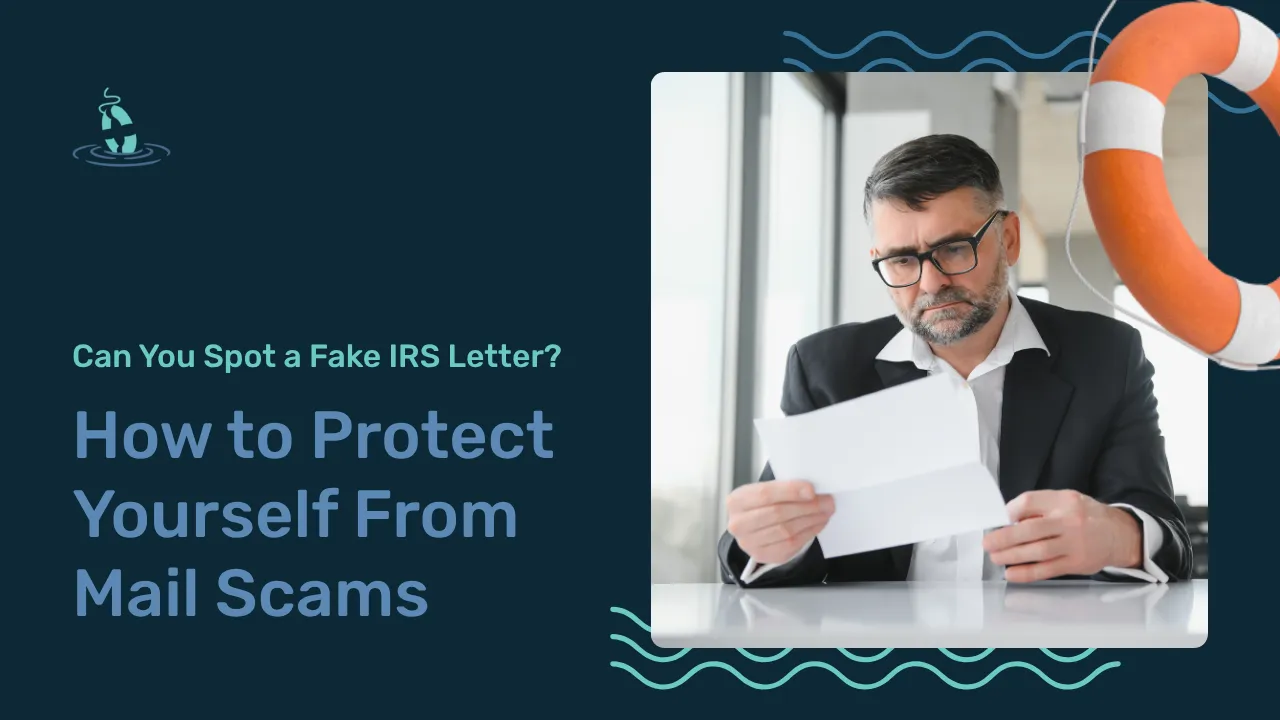
When most people think of IRS scams, they imagine phone calls pressuring them to send money as soon as possible — sometimes even threatening arrest if they don’t. These phone scams are relatively common, but criminals are now taking things to another level by creating fake IRS letters.
Some of these fake letters are more convincing than others. But when you understand how mail scams work and how to tell if a letter is legitimate, you can save yourself from becoming a victim. Here’s a look at how to spot a fake IRS letter and what to do if you receive one.
Who’s Behind IRS Mail Scams?
Many people panic when they get an unexpected notice from the IRS. Some criminals and criminal organizations take advantage of that fact. They create fake IRS letters telling people they owe money and must pay up immediately — and some people do.
Spotting Fake IRS Letters: What to Look For
The more familiar you are with legitimate IRS notices, the easier it becomes to spot a fake. These are a few ways to identify a fraudulent letter.
No Notice Number or IRS Logo
Each time the IRS sends a notice, it includes a notice number at the top right corner of the page. The notice will also have an IRS logo at the top left of the page. Many scammers send text-only letters that include neither.
No Official Government Envelope
When the IRS sends notices in the mail, those notices are in official government envelopes with the IRS logo on the front. Most scammers won’t go to the trouble of copying this envelope.
No Reason for Contact
When the IRS mails a notice, it includes a clear reason for contacting you. These are some common examples:
- You owe a balance
- The IRS has a question about your return
- There was an error on your return
- The IRS needs additional information from you
Legitimate letters will also give you a clear timeline for responding. In many cases, you have 30 days to act.
Spelling and Grammar Mistakes
Many scammers use poor grammar and spell words incorrectly. They also may use odd formatting or inconsistently capitalize words. Real communications from the IRS are vetted by professionals and should not have errors.
High-Pressure Language
A balance due notice from the IRS might state that you owe a certain amount immediately. However, scammers may use even more high-pressure language. The faster they can get you to pay, the less time you’ll have to think and question whether the letter is legitimate.
Threats of Arrest
Scammers who pretend to be the IRS may threaten to have you arrested if you don’t pay immediately. This is a major red flag.
The IRS will not arrest you for owing back taxes. Even criminal charges for tax fraud are filed only after a long investigation process. If your letter includes a threat of arrest, it’s certainly a fake.
Requests for Unusual Payment Methods
The IRS gives you a number of payment options for paying your tax debts:
- Check or money order payable to the United States Treasury
- Electronic bank draft
- Credit or debit card
Fake IRS letters will sometimes tell you to pay using gift cards or prepaid cards. Alternatively, a scam letter might ask you to write a check payable to a person or organization that is not the United States Treasury.
Requests for Personal Information
Any letter from the IRS that asks for your Social Security number or other sensitive information is not legitimate. The IRS already has your Social Security number on file.
Unfortunately, scammers and identity thieves often try to trick people into giving up their Social Security numbers through official-looking letters.
What if You’re Not Sure Whether an IRS Letter Is Fake?
If the scammer is very good, you might not be completely sure whether you’ve received a fake IRS letter. You don’t want to ignore a legitimate communication from the IRS, but you also don’t want to give your money to a scammer.
Fortunately, there’s an easy way to verify. Call the main IRS hotline at 800-829-1040 and ask. Don’t call the number on the notice — if it’s a fake IRS letter, you’ll just reach the scammer.
What to Do if You Get a Fake IRS Letter
If you’ve gotten a fake letter, you shouldn’t respond. However, it’s a good idea to report it. Government organizations take these reports seriously and use them to track down and prosecute scammers.
There are a couple of different options for reporting fake IRS letters. You can file a complaint online with the U.S. Treasury Inspector General for Tax Administration. You can also scan the letter and email it to phishing@irs.gov.
Find Real Tax Relief With Tax Lifeline
If you have tax debt, getting unexpected notices from the IRS can be especially stressful. The Tax Lifeline team can help you face your debt head-on. We’ll talk to you about your tax issues and formulate a customized plan to pull you back to financial safety.
Are you ready to get one step closer to peace of mind? Get in touch to schedule a consultation today.
Ready to be pulled to safety?
Grab the lifeline and let’s get you the freedom from tax debt you deserve!
Schedule A Consultation


